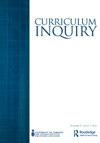塑造学校的享受和归属感:一位拉丁裔学生领袖的空间视角和实践
IF 1.6
3区 教育学
Q2 EDUCATION & EDUCATIONAL RESEARCH
引用次数: 0
摘要
改造城市学校的努力往往忽视了学生在塑造教育空间中的作用。所以,我问:学生,作为学校空间的主要使用者,是如何塑造他们的学校的?我从强调空间的社会生产的空间探究中,提供了对Azul的空间视角和实践的一瞥,Azul是一个来自工人阶级社区的年轻拉丁裔,也是她所在学校的联合学生会主席。依靠人种学观察和半结构化访谈,我研究了Azul和她的同龄人将学校空间从其预期用途转变为学生友好的民主空间的实例。我的研究结果表明,对享受和归属感的归属和塑造是他们生产学校空间的关键组成部分。学校空间的生活课程是在年轻人协商和构建学校空间的过程中形成的,以更加包容他们的教育愿望和需求。通过关注Azul和她的同龄人的空间视角和实践,我提供了对学生和学生领袖的社会政治承诺的见解,特别是他们作为学校空间中重要的社会存在和行动者的日常生活。这些研究表明,学生对地方的表述,将学校作为可能性和希望的空间,对于创建公平的学校很重要,在公平的学校中,学生可以成为建立学校集体愿景的合作伙伴。本文章由计算机程序翻译,如有差异,请以英文原文为准。
Shaping enjoyment and belonging at school: The spatial perspectives and practices of one Latina student leader
Abstract Efforts to transform urban schools often overlook the role of students in shaping educational spaces. And so, I ask: How do students, as the primary users of school space, make and shape their school? I draw from spatial inquiry that emphasizes the social production of space to provide a glimpse into the spatial perspectives and practices of Azul, a young Latina from a working-class community and Associated Student Body president of her school. Relying on ethnographic observations and semi-structured interviews, I examine instances where Azul and her peers transform school spaces from their intended uses to student-friendly, democratic spaces. My findings indicate that ascribing and shaping enjoyment and belonging are crucial components to their production of school space. A lived curriculum of school space is shaped as young people negotiate and construct school space to be more inclusive of their educational wants and needs. By focusing on the spatial perspectives and practices of Azul and her peers, I offer insights into the socio-political commitments of students and student leaders, in particular, in their everyday lives as significant social beings and actors over school space. These reveal that students’ articulations about place that frame schools as spaces of possibility and hope are important for creating equitable schools where students may serve as partners in building a collective vision for schools.
求助全文
通过发布文献求助,成功后即可免费获取论文全文。
去求助
来源期刊

Curriculum Inquiry
EDUCATION & EDUCATIONAL RESEARCH-
CiteScore
3.10
自引率
17.60%
发文量
37
期刊介绍:
Curriculum Inquiry is dedicated to the study of educational research, development, evaluation, and theory. This leading international journal brings together influential academics and researchers from a variety of disciplines around the world to provide expert commentary and lively debate. Articles explore important ideas, issues, trends, and problems in education, and each issue also includes provocative and critically analytical editorials covering topics such as curriculum development, educational policy, and teacher education.
 求助内容:
求助内容: 应助结果提醒方式:
应助结果提醒方式:


